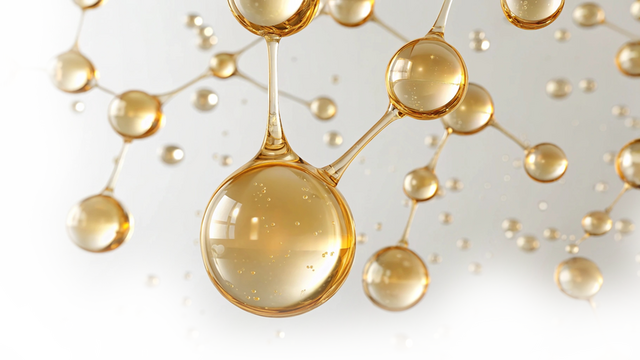
Panel discussion on...
Peptides
Role ofpeptides in anti-ageing skin care
Peptides are short chains of two to fifty amino acids that are joined by peptide bonds. In nature, most chemical reactions, biological responses, and regulatory processes are modulated in some part by specific amino acid sequences. The transfer of these interactive sequences and the biological activities they induce to short, stable, and readily synthesized peptides has created a diverse field of modulating molecules applicable to dermatology and skin care industries (1). Peptides can beneficially affect multiple physiological pathways in the skin and contribute in the improvement of skin health, while being safe and hypo-allergenic (1-2). In recent years, peptides have gained a lot of traction in the personal care market and are recognized by consumers as effective, science-backed ingredients (3).
Current skin care finished goods launches increasingly highlight anti-aging claims. Thus, incorporating peptides into skincare products aligns well with the growing demand for scientifically backed solutions within anti-aging skincare trends. Their ability to deliver noticeable results without harsh side effects makes them suitable for all skin types. By using peptides, brands can cater to consumers seeking innovative and effective anti-aging solutions that support long-term skin health (4). Basically, peptides are rockstars in the anti-aging category. According to Dr. Khalifian “Peptides are particularly beneficial for aging or dehydrated skin. They can signal skin cells to produce collagen and elastin, or to improve texture, firmness, and elasticity. They also make a great addition after other, in-office cosmetic procedures” (5).
Peptide beauty is leveling up in 2025 and represents year's hottest ingredient segment (6).
Recent new peptide launches include:
The encapsulated bioactive hexapeptide derived from the sequence of human skin type I collagen [INCI: Collagen Amino Acids (and) Lecithin (and) Maltodextrin (and) Aqua / Water] from Mibelle Biochemistry. It is a six amino acid peptide containing the characteristic triplet sequence Gly-X-Y of the native human skin type I collagen and its most abundant amino acids: Gly-HyP-Lys-Gly-Pro-Lys. The ingredient's composition stimulates collagen synthesis and dermal remodeling for a more youthful, radiant appearance. Shorter hexapeptide improves the ingredient's penetration while the presence of Lys (lysine) improves its solubility. The peptide is encapsulated in liposomes to ensure stability and delivery, then it is spray granulated onto maltodextrin to ensure a long shelf life. Recommended use level is 2%. The ingredient acts through key mechanisms including: promoting procollagen I production, boosting hyaluronic acid release, protecting dermal collagen fibers from aging, tightening facial contours and increasing skin elasticity and density. The peptide is positioned as a multifunctional that addresses the visible effects of aging at the root level. Clinical research demonstrated its efficacy in maintaining elasticity, firmness, and a youthful skin structure (7).
A synthetic peptide for skin care [INCI: Mannitol (and) Acetyl sh-Tetrapeptide-1 (and) Lauroyl sh-Tetrapeptide-1] from BASF. It is inspired by the natural regenerative process of the skin, based on a naturally occurring human biopeptide, and align with the slow aging trend. It is free of preservatives and 99% of natural origin. It was tested at 0.2% in a double-blind, randomized, split-face clinical trial of 32 women (44 to 64 years old) against a placebo. According to the manufacturer, after 14 days of product application: subjects' crow's feet appeared smoother, with an 11% decrease in average roughness and a 14% decrease in maximum relief amplitude; and skin isotropy increased by 15%, indicating a skin resurfacing effect; and after 28 days of product application, the skin had re-densified, with a 21% increase in the echogenic surface area of the dermis. Overall, this peptide demonstrated clinically proven triple action for slow aging: smoothing, resurfacing, and re-densifying. Extensive in vitro testing additionally confirmed its ability to support skin regeneration and help to slow the visible signs of skin aging (3).
In sum, areas such as inflammation, pigmentation, cell proliferation and migration, angiogenesis, innate immunity, and extracellular matrix synthesis have yielded viable peptide candidates (1).
The global cosmetic peptide manufacturing market is forecast to expand at a CAGR of 6.6% and thereby increase from a value of US$ 259.9 million in 2025 to US$ 406.9 million by the end of 2032 (8).
To unlock the full potential of bioactive peptides in cosmetics further studies should be conducted. This could include investigating novel sources of peptides, optimizing extraction methods, and exploring innovative delivery systems to enhance their penetration and activity within the skin. By harnessing peptide’s uniqueness to develop innovative and effective skincare products it is possible to cater to the diverse needs of consumers (9).
Panelists
References and notes
- Zhang L, Falla TJ. Cosmeceuticals and peptides. Clin. Dermatol. 2009; 27: 485–494. https://pubmed.ncbi.nlm.nih.gov/19695481/
- Aguilar-Toalá JE et al. Potential role of natural bioactive peptides for development of cosmeceutical skin products. Peptides. 2019; 122: 170170. https://pubmed.ncbi.nlm.nih.gov/31574281/
- New Release: Pepsensyal™: BASF’s Personal Care business expands its peptide portfolio with a new slow-aging peptide https://www.basf.com/global/en/media/news-releases/2024/10/p-24-299
- Top 8 Anti-Aging Skincare Trends, Mature Skin Solution 2025 https://rixincosmetics.com/blog/anti-aging-skincare-trends/#antiaging-skincare-trends
- 8 Best Skin-Care Ingredients for Mature Skin in 2025| Allure https://www.allure.com/story/active-ingredients-mature-skin
- Peptide Beauty is Leveling Up in 2025 https://www.gcimagazine.com/ingredients/skin-care/news/22931772/peptide-beauty-is-leveling-up-in-2025
- CollPerfect™ P6 Bio-optimized collagen peptide for ageless beauty https://mibellebiochemistry.com/collperfecttm-p6
- Cosmetic Peptide Manufacturing Market. https://www.persistencemarketresearch.com/market-research/cosmetic-peptide-manufacturing-market.asp
- Ngoc LTN, Moon J-Y, Lee Y-C. Insights into Bioactive Peptides in Cosmetics. Cosmetics. 2023; 10: 111. https://www.mdpi.com/2079-9284/10/4/111




































